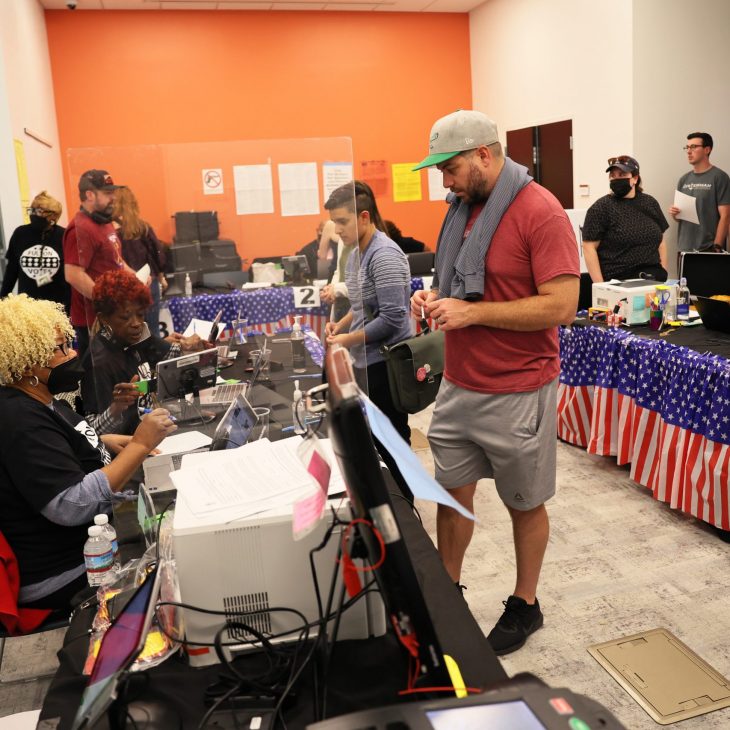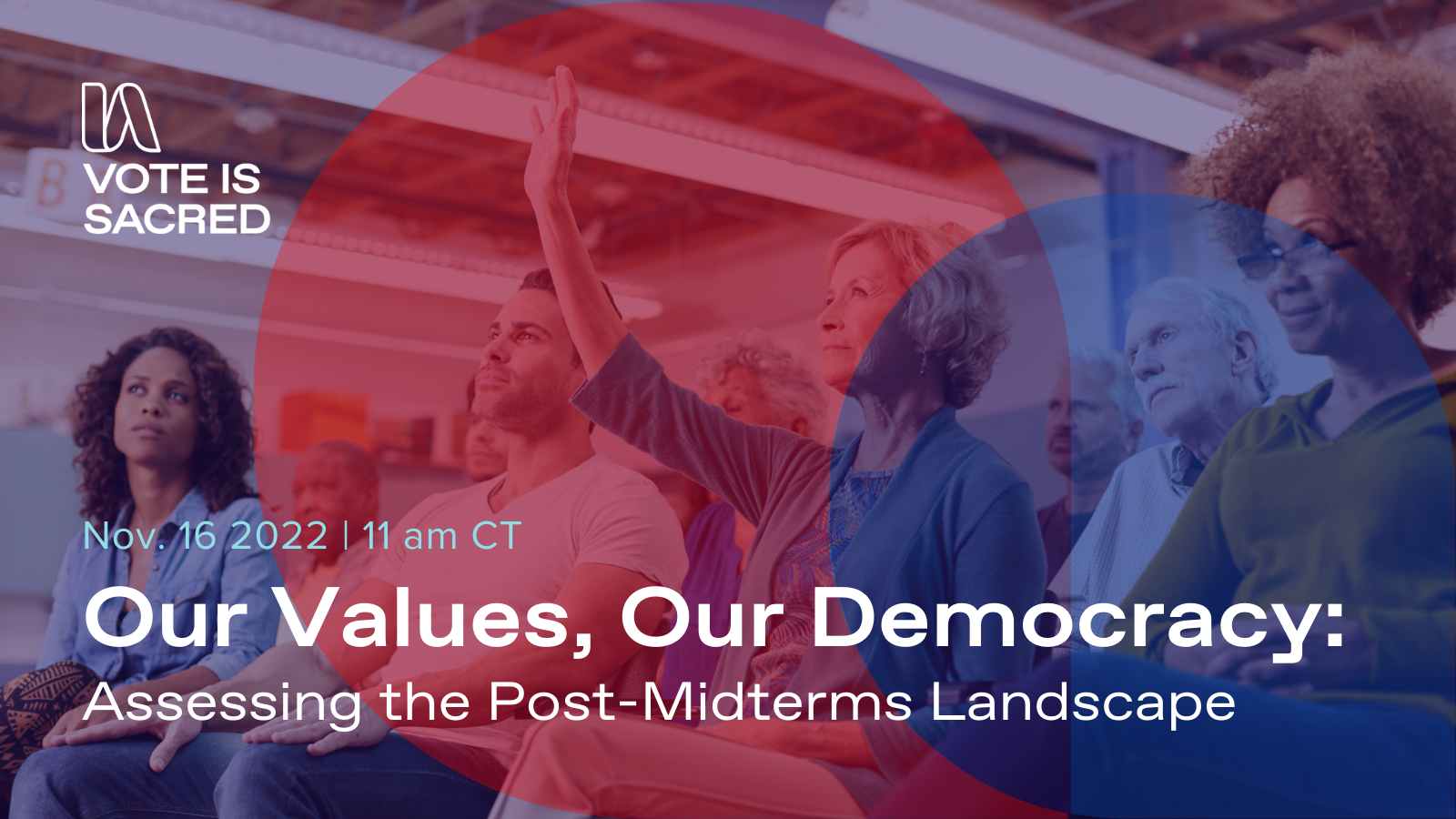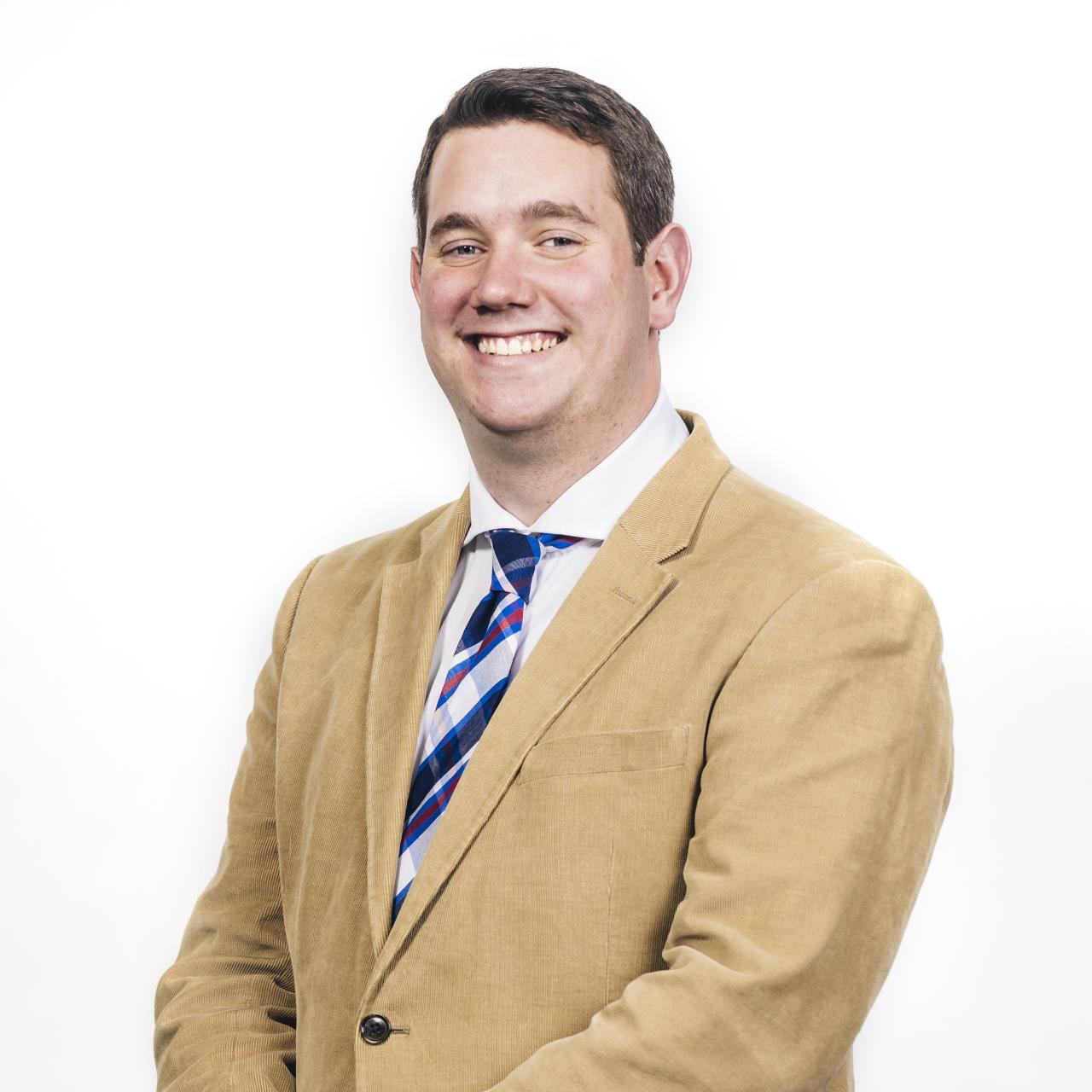How Everyday People, and Humility, Give this Policy Maker Hope
November 7, 2022

Interfaith America’s Mary Ellen Giess sat down with Chris Crawford, a policy advocate at Protect Democracy and a Vote is Sacred thought leader, to discuss how his religious values connect to voting, public engagement, and his organization’s work to promote a free and fair election.

This conversation was lightly edited for length and clarity.
Mary Ellen Giess: For Interfaith America, the idea of Interfaith America only exists within the context of a strong democracy. We were also founded on religious and ethical beliefs that connect deeply to our democratic principles. How do your own religious beliefs inspire you to support the strength of our democracy?
Chris Crawford: The way I approach democracy stems from the way I approach human dignity in general. My public engagement is rooted in my Catholic faith and the belief in the dignity of every person and that every person is made in the image and likeness of God. That core religious value plays out in a couple of ways in my advocacy for democracy. First, I believe every person has a right to vote as part of their right to help create the society in which they want to live and create better conditions for themselves as well as the most vulnerable people. That has to be a focus of our democracy. I think democracies facilitate human flourishing. The opportunity for people to reach their full potential – the best chance of that is in the context of a democracy. My faith causes me to come at this from a different angle than other people might approach democracy; for me it’s about the idea that democracy is a means to respect the dignity of every person and help them to flourish and have their rights secured.
MEG: How does that understanding resonate with how you understand the founding principles of our nation?
CC: I love the Declaration of Independence; I love the lofty ideals contained there. People who have gotten our politics right over time have seen it as their mission to help us live up to those ideals while recognizing we haven’t done so many times over time. Expanding the idea of who is covered in the words of “all men are created equal” – that’s a sacred obligation for each of us. There was something in the Founding about disrupting the way power was wielded in society. Our Founders wanted people to be able to determine our own future, and they didn’t want to be serving a king. They wanted more self-determination and I see that as connected to my own religious values around democracy.
Share
Related Articles
American Civic Life
American Civic Life
We Commemorate, We Commit: Out of Catastrophe, a Conversation on Connection and Repair
Racial Equity
A Year After George Floyd’s Murder: How Black Interfaith Can Give Hope to America

MEG: For many it feels like the very foundations of our democracy are being tested. How can religious communities and interfaith leaders support a free and fair election and build the strength of our democracy?
CC: Religious communities have powerful social capital and are the foundational place to build community and networks in the United States. In my opinion, they should see themselves as having a role in preserving our democracy and serving everyone – this should be a crucial part of religious communities’ engagement in our democracy. There’s enormous power, but not in a crass way – not power for its own sake – rather, there’s a large network of people in faith communities who can create social change, and protecting democracy should be a part of how they use that power. Religious and moral communities are called to be above party politics and part of that idea is protecting institutions, holding politicians and candidates accountable, upholding truth and oaths leaders have made to the country. I also think there’s something essential about how I think about my political engagement as a Catholic, that I should be a bridge builder and how I see myself within a larger body where not everyone has to be exactly the same. Here’s what I mean by this – when we’re in church on Sunday, we all have different beliefs and backgrounds, but we are united in being there and receiving communion together. There’s a communion of differences within the Catholic community. There’s something powerful about bringing that idea to the public square, building a sense of unity even while we’re all different. That’s an important piece of my understanding about how faith leaders can engage in building democracy.
MEG: Do you see distinctive opportunities for interfaith leaders, alongside religious leaders?
CC: If you’re engaging in interfaith work, you’re inherently showing the values of working across difference. Especially if you are engaging in that work while wearing your clerical garments, interfaith engagement among clergy brings a visible example of different beliefs coming together on a common cause. You can very clearly see that we have fundamental differences, and that we care deeply about those differences, but we’re part of a larger project that’s important and beneficial for all of us. It’s a powerful example. If you do this work in an interfaith way, you’re also able to hear the challenges that different groups are facing. In some of my previous work, I had a very Christian-centric idea of what faith engagement in politics looked like. I assumed everyone had similar experiences with different faith commitments beneath them – until I talked more to my Muslim and Jewish brothers and sisters and saw how fundamentally different those experiences are, the way we orient to our institutions and political movements, the way we think about power is so different. If I hadn’t come to those interfaith tables, I wouldn’t have been able to try to represent those experiences as authentically in the work I was doing.
MEG: Tell me more about your own work right now in living out these religious commitments in the work around democracy. What are some of your top priorities and what have been some of the most challenging elements in regard to working across differences in the work you’re moving forward?
CC: One interesting project that Protect Democracy has been working on is updating the Electoral Count Act of 1887. That law sets out the process through which we cast and count electoral votes in Presidential elections. The law was drafted in 1887 in response to the contested election of 1876, and a lot of the language in it is vague and outdated. It needs to be updated. In the legal strategy surrounding January 6, they were trying to take advantage of the ambiguities of the Electoral Count Act. These ambiguities are risky for everyone – we can’t predict the future; we can’t know who will be sitting in the vice president’s chair going forward. The legal theories that we think are incorrect but that are brought up are the ideas that the vice president could set aside slates of electors in the way that some people called on Vice President Pence to do in 2021. Other ambiguities leave us vulnerable to either misunderstanding or people intentionally trying to take advantage of this outdated law in order to overturn results of a free and fair election. Updating this law has been a key priority for democracy activists for some time. At Protect Democracy, we’ve tried to play our role in supporting this change and have tried to be a part of a bipartisan effort to pass a reform of the Electoral Count Act.
At first glance, you might wonder how that has anything to do with my faith. But there are a few elements underneath this work that connect deeply. One is that the peaceful transfer of power is a hallmark of having a functioning democracy. Updating the ECA will help preserve the peaceful transfer of power. There are reforms we can make in our political systems that can turn down the temperature in our culture and help to prevent violence and discord. If the laws are clearer (around) the transfer of power, you wouldn’t even have people showing up at a rally like the one held on January 6. There is systemic work we can do that makes it easier to do the cultural and relational work. From a bridgebuilding standpoint, one thing I’ve been interested in throughout this project is how the Bipartisan Working Group in Congress, which was a primary driver in crafting this legislation, has worked to try to find common ground and appeal to each other’s interests. There’s an understanding for all involved that no one is going to get the bill they may have crafted for themselves, that it will take compromise. That’s taken humility from all sides, folks both inside and outside elected office. The Rules Committee voted the bill favorably out of committee 14-1, and you don’t see numbers like that anymore. It’s a sign of the success of the compromise that we have seen that kind of momentum so far.
MEG: I like that you mentioned humility and I often think of humility as a religious virtue in our bridgebuilding work. It’s something we lack culturally right now in so many ways. How have you seen the idea of humility play out in your work?
CC: I can say for my part, it’s something I have learned over the past year following January 6. At the time, I was really fired up about some of the activities I was seeing among pro-life organizations in particular, in not standing up to some of the lies about the election. These are leaders and organizations I would otherwise feel affinity with because of my religious beliefs. At that moment, though, I penned an op-ed and went after what they were doing. In hindsight, I wish I hadn’t done that. I think the better approach from both a relationship-building standpoint and from the value of humility – it would have been tactically better and a better representation of my values – to reach out directly to people with whom I had concerns, to ask why they were doing this, especially raising the questions within our shared values of our relationship. I share this as an example of when I got it wrong in going public in a way that centered myself, rather than the cause on which I’m working. I think that was a mistake, and throughout this work on the ECA and other efforts, I’ve tried to think about the right way to listen better, treat people as though they are engaging in good faith, and address good faith concerns. I feel as though I learned a lesson about the value of humility.
At the time, I felt that going on the attack publicly was the best route. But even then, it weighed on me that it didn’t feel like a reflection on how I want to engage in politics and advocacy. My perspective on this changed in listening to a talk by a nun on healing. I realized listening to that talk that on a personal level, I had done something I shouldn’t have done, not just as a tactical matter but as a person of faith, that these kinds of public attacks weren’t how I wanted to engage. I’ve tried to take a different approach and meet people where they are, listen, and find ways to have productive conversations instead of more public attacks going forward.
MEG: What is your greatest hope for our democracy coming out of the 2022 midterms? Or, what gives you hope looking at our democracy now?
CC: I feel a lot of gratitude that leads to hope. We have such a large country, we have big, decentralized election systems. Because of that, we have thousands and thousands of people that have to volunteer their time, get trained, show up on Election Day to run our election system. These are everyday people, it’s a significant time commitment, it’s a long day for them but they put in the work because they care about our democracy. They won’t do a perfect job, but they do a pretty darn good job. Because our system requires everyday people to be a part of it, I am inspired by that. Especially in the face of greater challenges this year with conspiracy theories and threats of violence, I am grateful for all of the people stepping up in their communities. They give me hope that the election will run smoothly, people will see the value of their efforts, and the value of the democratic system as well.
Post-election, I also feel like there is a strong desire to build right now. I just finished Eboo Patel’s book which is one example of this. What (Interfaith America) is doing, what many people are doing, is thinking about what we need to build to strengthen our democracy and build our society. That’s giving me hope in the midst of the difficulties – I hope that people are opting in more, stepping in more, and engaging more.

Chris Crawford
Chris Crawford is a policy advocate at Protect Democracy. He previously worked as a senior program associate at Democracy Fund, where he managed a portfolio of faith-based initiatives focused on promoting pluralism in the United States. Crawford began his career doing political organizing at Susan B. Anthony List, the nation’s largest pro-life political organization. He is a graduate of The George Washington University and is currently pursuing a master’s degree in nonprofit administration from The University of Notre Dame.



